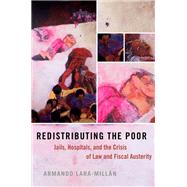
Redistributing the Poor Jails, Hospitals, and the Crisis of Law and Fiscal Austerity
by Lara-Millán, ArmandoBuy New
Buy Used
Rent Textbook
Rent Digital
How Marketplace Works:
- This item is offered by an independent seller and not shipped from our warehouse
- Item details like edition and cover design may differ from our description; see seller's comments before ordering.
- Sellers much confirm and ship within two business days; otherwise, the order will be cancelled and refunded.
- Marketplace purchases cannot be returned to eCampus.com. Contact the seller directly for inquiries; if no response within two days, contact customer service.
- Additional shipping costs apply to Marketplace purchases. Review shipping costs at checkout.
Summary
Author Biography
Armando Lara-Mill?n is Assistant Professor of Sociology at University of California, Berkeley. He is an ethnographer and historical sociologist. He studies how powerful organizations generate truths and rationalize problems, shaping the life fortunes of large numbers of people. He has undertaken studies in a wide range of contexts, including law, medicine, criminal justice, economic pricing, and urban poverty governance. His work has appeared in the American Sociological Review, Criminology, and in the volume The Many Hands of the State. He is also the recipient of awards from the National Science Foundation, Law and Society Association, the Max Planck Institute for the Study of Societies, the Ford Foundation, the Society for the Study of Social Problems, and the American Sociological Association.
Table of Contents
Preface
Introduction
Part One: The Expansion of Medicine in Large Urban Jail
Chapter 1: Summoning the Sick and Violent into Jail.
Chapter 2: The Medicalization of the Los Angeles County Jail System
Part Two: The Restriction of Medicine in Large Public Hospitals
Chapter 3: Opioids, Observation, and Restricting Access in the Public Emergency Room
Chapter 4: Building a Public Hospital Everyone Knows is Too Small
Conclusion: Towards the Administrative Disappearing of Social Suffering.
Appendix: Historically Embedded Ethnography.
References
Endnotes
An electronic version of this book is available through VitalSource.
This book is viewable on PC, Mac, iPhone, iPad, iPod Touch, and most smartphones.
By purchasing, you will be able to view this book online, as well as download it, for the chosen number of days.
Digital License
You are licensing a digital product for a set duration. Durations are set forth in the product description, with "Lifetime" typically meaning five (5) years of online access and permanent download to a supported device. All licenses are non-transferable.
More details can be found here.
A downloadable version of this book is available through the eCampus Reader or compatible Adobe readers.
Applications are available on iOS, Android, PC, Mac, and Windows Mobile platforms.
Please view the compatibility matrix prior to purchase.
